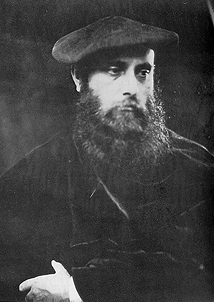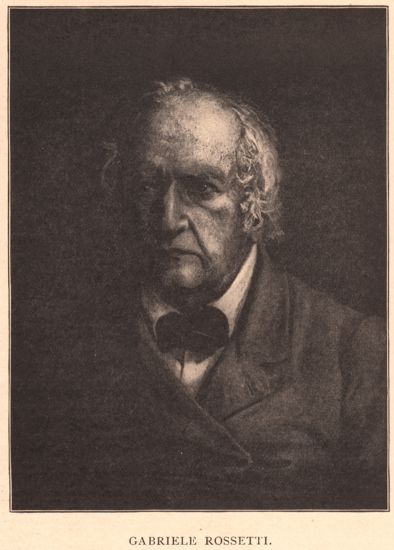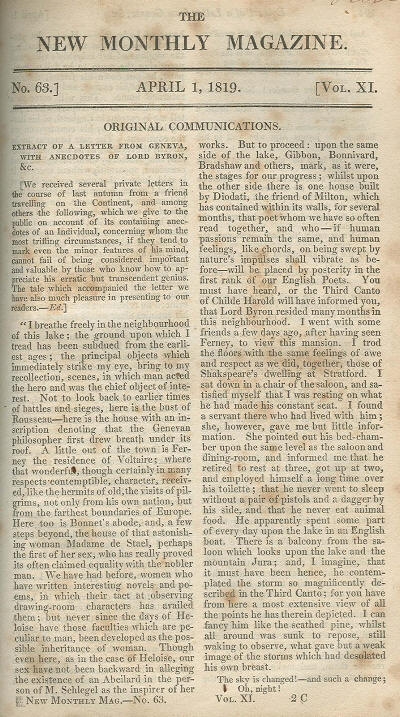|
Gaetano Polidori
Gaetano Fedele Polidori (1763–1853) was an Italian writer, political and scholar living in Highgate. He was the son of Agostino Ansano Polidori (1714–1778), a physician and poet who lived and practised in his native Bientina, near Pisa, Tuscany. Polidori studied law at the University of Pisa. He became secretary to the tragedian Vittorio Alfieri in 1785 and remained with him four years. He came to England from Paris in 1790 after resigning as Alfieri's secretary. He settled in Highgate, working as an Italian teacher and translator. He translated various literary works, notably, John Milton's '' Paradise Lost'' and Horace Walpole's ''The Castle of Otranto'', besides other writings of Milton and Lucan. He wrote prolifically, producing his own fiction, poetry, criticism, and tragedies. He also set up a private press at his home, where amongst other works (mostly his own), he printed the first editions of some poems by his grandchildren, Dante Gabriel Rossetti and Chris ... [...More Info...] [...Related Items...] OR: [Wikipedia] [Google] [Baidu] |
Bientina
Bientina () is a ''comune'' (municipality) in the Province of Pisa in the Italian region Tuscany. History The toponym Bientina is attested the first time in 793 as Blentina and probably comes from the Etruscan name Plitine. Geography Territory Bientina is located between Lucca's plain (Piana di Lucca) and the Valdarno. It is about to the west of Florence and about east of Pisa and it borders the following municipalities: Altopascio, Buti, Calcinaia, Capannori, Castelfranco di Sotto, Santa Maria a Monte, Vicopisano. To the north of the town there was once the largest lake in Tuscany, the Lago di Bientina, until it was drained in 1859 and converted to farmland. The municipality is formed by the municipal seat of Bientina and the villages ('' frazioni'') of Caccialupi, Puntone, Quattro Strade and Santa Colomba. Climate Bientina experiences a Mediterranean Climate like other cities in Central Italy. Being more distant from the sea, winters are usually less ... [...More Info...] [...Related Items...] OR: [Wikipedia] [Google] [Baidu] |
Holmer Green
Holmer Green is a village in the civil parish of Little Missenden, in Buckinghamshire, England. It is next to Hazlemere, about south of Great Missenden. History Holmer Green is named after the manor of Holmer that covered a significant part of the parish of Little Missenden in the Middle Ages. The early history of the village is essentially one of people moving out of Little Missenden over the centuries and settling on a large area of heath (now vanished) known as Wycombe Heath or Holmer Heath. The 'Holmer' part of the toponym was first recorded as ''Holeme'' in 1208 and is probably derived from Old English. It is commonly thought to derive from 'mere in a hollow' which would refer to Holmer Pond. However, there are certain factors that do not support this theory and the ''-mer'' element may actually translate to an Old English word meaning 'boundary'. The 'Green' part of the name refers to a large and ancient Green, probably dating from the 13th century that used to exist her ... [...More Info...] [...Related Items...] OR: [Wikipedia] [Google] [Baidu] |
Dante Alighieri
Dante Alighieri (; – 14 September 1321), probably baptized Durante di Alighiero degli Alighieri and often referred to as Dante (, ), was an Italian poet, writer and philosopher. His ''Divine Comedy'', originally called (modern Italian: ''Commedia'') and later christened by Giovanni Boccaccio, is widely considered one of the most important poems of the Middle Ages and the greatest literary work in the Italian language. Dante is known for establishing the use of the vernacular in literature at a time when most poetry was written in Latin, which was accessible only to the most educated readers. His ''De vulgari eloquentia'' (''On Eloquence in the Vernacular'') was one of the first scholarly defenses of the vernacular. His use of the Florentine dialect for works such as '' The New Life'' (1295) and ''Divine Comedy'' helped establish the modern-day standardized Italian language. His work set a precedent that important Italian writers such as Petrarch and Boccaccio would late ... [...More Info...] [...Related Items...] OR: [Wikipedia] [Google] [Baidu] |
Highgate Cemetery
Highgate Cemetery is a place of burial in north London, England. There are approximately 170,000 people buried in around 53,000 graves across the West and East Cemeteries. Highgate Cemetery is notable both for some of the people buried there as well as for its ''de facto'' status as a nature reserve. The Cemetery is designated Grade I on the Register of Historic Parks and Gardens. It is one of the Magnificent Seven cemeteries in London. Location The cemetery is in Highgate N6, next to Waterlow Park, in the London Borough of Camden. It comprises two sites, on either side of Swains Lane. The main gate is on Swains Lane just north of Oakshott Avenue. There is another, disused, gate on Chester Road. The nearest public transport ( Transport for London) is the C11 bus, Brookfield Park stop, and Archway tube station. History and setting The cemetery in its original formthe northwestern wooded areaopened in 1839, as part of a plan to provide seven large, modern cemeteries, now kno ... [...More Info...] [...Related Items...] OR: [Wikipedia] [Google] [Baidu] |
William Michael Rossetti
William Michael Rossetti (25 September 1829 – 5 February 1919) was an English writer and critic. Early life Born in London, Rossetti was a son of immigrant Italian scholar Gabriele Rossetti and his wife Frances Rossetti ''née'' Polidori; he was the brother of Maria Francesca Rossetti, Dante Gabriel Rossetti and Christina Georgina Rossetti. Career He was one of the seven founder members of the Pre-Raphaelite Brotherhood in 1848, and became the movement's unofficial organizer and bibliographer. He edited the Brotherhood's literary magazine '' The Germ'' which published four issues in 1850. Rossetti wrote the poetry reviews for this magazine. It was William Michael Rossetti who recorded the aims of the Pre-Raphaelite Brotherhood at their founding meeting in September 1848: #To have genuine ideas to express; #To study Nature attentively, so as to know how to express them; #To sympathize with what is direct and serious and heartfelt in previous art, to the exclusion o ... [...More Info...] [...Related Items...] OR: [Wikipedia] [Google] [Baidu] |
Maria Francesca Rossetti
Maria Francesca Rossetti (17 February 1827 – 24 November 1876) was a London-born English author and nun. She was the sister of artist Dante Gabriel Rossetti and William Michael Rossetti, and of Christina Georgina Rossetti, who dedicated her 1862 poem '' Goblin Market'' to Maria. Literary and religious life She was the author of ''The Shadow of Dante: Being an essay towards studying himself, his world, and his pilgrimage'' (published 1871). She also acted as a governess during the years of family hardship brought on by her father's failing health, and tutored a young Lucy Madox Brown, a future sister-in-law. At the age of 46, Maria joined the Society of All Saints, an Anglican order for women. Lucy Madox Brown wanted to paint her in her habit. She made an English translation of the Monastic Diurnal for her order, ''The Day Hours and Other Offices as Used by the Sisters of All Saints'', which was used by her order until 1922. She, along with her sister Christina, donated her t ... [...More Info...] [...Related Items...] OR: [Wikipedia] [Google] [Baidu] |
Gabriele Rossetti
Gabriele Pasquale Giuseppe Rossetti (28 February 1783 – 24 April 1854) was an Italian nobleman, poet, constitutionalist, scholar, and founder of the secret society Carbonari. Rossetti was born in Vasto in the Kingdom of Naples. He was Roman Catholic. His support for Italian revolutionary nationalism forced him into political exile in England in 1821. Early career and exile Rossetti's first edition of poems was printed in 1807 by Giovanni Avalloni, who offered to have Rossetti's poems published after hearing him recite a few passages. Throughout his early career, Rossetti published poems that were "patriotic" and supported the "popular movement" in Sicily which resulted in him receiving a grant from Ferdinand I of the Two Sicilies in 1820. When the king revoked the constitution in 1821, many supporters of the constitution were persecuted, but Rossetti instead, was forced into exile in Malta for three years before a British admiral of the Royal Navy sent Rossetti to London ... [...More Info...] [...Related Items...] OR: [Wikipedia] [Google] [Baidu] |
The Vampyre
"The Vampyre" is a short work of prose fiction written in 1819 by John William Polidori taken from the story Lord Byron told as part of a contest among Polidori, Mary Shelley, Lord Byron, and Percy Shelley. The same contest produced the novel '' Frankenstein; or, The Modern Prometheus''. ''The Vampyre'' is often viewed as the progenitor of the romantic vampire genre of fantasy fiction. The work is described by Christopher Frayling as "the first story successfully to fuse the disparate elements of vampirism into a coherent literary genre." Characters * Lord Ruthven: a suave British nobleman, the vampire * Aubrey: a wealthy young gentleman, an orphan * Ianthe: a beautiful Greek woman Aubrey meets on his journeys with Ruthven * Aubrey's sister: who becomes engaged to the Earl of Marsden * Earl of Marsden: who is also Lord Ruthven Plot Aubrey meet ... [...More Info...] [...Related Items...] OR: [Wikipedia] [Google] [Baidu] |
English Language
English is a West Germanic language of the Indo-European language family, with its earliest forms spoken by the inhabitants of early medieval England. It is named after the Angles, one of the ancient Germanic peoples that migrated to the island of Great Britain. Existing on a dialect continuum with Scots, and then closest related to the Low Saxon and Frisian languages, English is genealogically West Germanic. However, its vocabulary is also distinctively influenced by dialects of France (about 29% of Modern English words) and Latin (also about 29%), plus some grammar and a small amount of core vocabulary influenced by Old Norse (a North Germanic language). Speakers of English are called Anglophones. The earliest forms of English, collectively known as Old English, evolved from a group of West Germanic (Ingvaeonic) dialects brought to Great Britain by Anglo-Saxon settlers in the 5th century and further mutated by Norse-speaking Viking settlers starting in the 8 ... [...More Info...] [...Related Items...] OR: [Wikipedia] [Google] [Baidu] |
Lord Byron
George Gordon Byron, 6th Baron Byron (22 January 1788 – 19 April 1824), known simply as Lord Byron, was an English romantic poet and peer. He was one of the leading figures of the Romantic movement, and has been regarded as among the greatest of English poets. Among his best-known works are the lengthy narratives ''Don Juan'' and '' Childe Harold's Pilgrimage''; many of his shorter lyrics in '' Hebrew Melodies'' also became popular. Byron was educated at Trinity College, Cambridge, later traveling extensively across Europe to places such as Italy, where he lived for seven years in Venice, Ravenna, and Pisa after he was forced to flee England due to lynching threats. During his stay in Italy, he frequently visited his friend and fellow poet Percy Bysshe Shelley. Later in life Byron joined the Greek War of Independence fighting the Ottoman Empire and died leading a campaign during that war, for which Greeks revere him as a folk hero. He died in 1824 at the age of 3 ... [...More Info...] [...Related Items...] OR: [Wikipedia] [Google] [Baidu] |
John William Polidori
John William Polidori (7 September 1795 – 24 August 1821) was a British writer and physician. He is known for his associations with the Romantic movement and credited by some as the creator of the vampire genre of fantasy fiction. His most successful work was the short story " The Vampyre" (1819), the first published modern vampire story. Although the story was at first erroneously credited to Lord Byron, both Byron and Polidori affirmed that the author was Polidori. Family John William Polidori was born on 7 September 1795 in Westminster, the oldest son of Gaetano Polidori, an Italian political émigré scholar, and his wife Anna Maria Pierce, an English governess. He had three brothers and four sisters. His sister, Frances Polidori, married the exiled Italian scholar Gabriele Rossetti, and thus Polidori, posthumously, became the uncle of Maria Francesca Rossetti, Dante Gabriel Rossetti, William Michael Rossetti, and Christina Georgina Rossetti. William Michael Rossett ... [...More Info...] [...Related Items...] OR: [Wikipedia] [Google] [Baidu] |
English People
The English people are an ethnic group and nation native to England, who speak the English language, a West Germanic language, and share a common history and culture. The English identity is of Anglo-Saxon origin, when they were known in Old English as the ('race or tribe of the Angles'). Their ethnonym is derived from the Angles, one of the Germanic peoples who migrated to Great Britain around the 5th century AD. The English largely descend from two main historical population groups the West Germanic tribes (the Angles, Saxons, Jutes and Frisians) who settled in southern Britain following the withdrawal of the Romans, and the partially Romanised Celtic Britons already living there.Martiniano, R., Caffell, A., Holst, M. et al. Genomic signals of migration and continuity in Britain before the Anglo-Saxons. Nat Commun 7, 10326 (2016). https://doi.org/10.1038/ncomms10326 Collectively known as the Anglo-Saxons, they founded what was to become the Kingdom of England by t ... [...More Info...] [...Related Items...] OR: [Wikipedia] [Google] [Baidu] |


.jpg)






_-_Vampyre%2C_1819.jpg)
